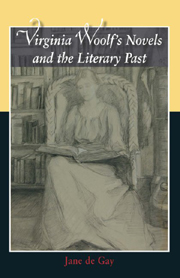Book contents
- Frontmatter
- Contents
- Acknowledgements
- Abbreviations
- Introduction
- 1 From Woman Reader to Woman Writer: The Voyage Out
- 2 Tradition and Exploration in Night and Day
- 3 Literature and Survival: Jacob's Room and Mrs Dalloway
- 4 To the Lighthouse and the Ghost of Leslie Stephen
- 5 Rewriting Literary History in Orlando
- 6 ‘Lives Together’: Literary and Spiritual Autobiographies in The Waves
- 7 Bringing the Literary Past to Life in Between the Acts
- Conclusion
- Select Bibliography
- Index
4 - To the Lighthouse and the Ghost of Leslie Stephen
Published online by Cambridge University Press: 12 September 2012
- Frontmatter
- Contents
- Acknowledgements
- Abbreviations
- Introduction
- 1 From Woman Reader to Woman Writer: The Voyage Out
- 2 Tradition and Exploration in Night and Day
- 3 Literature and Survival: Jacob's Room and Mrs Dalloway
- 4 To the Lighthouse and the Ghost of Leslie Stephen
- 5 Rewriting Literary History in Orlando
- 6 ‘Lives Together’: Literary and Spiritual Autobiographies in The Waves
- 7 Bringing the Literary Past to Life in Between the Acts
- Conclusion
- Select Bibliography
- Index
Summary
Father's birthday. He would have been … 96, yes, today; & could have been 96, like other people one has known; but mercifully was not. His life would have entirely ended mine. What would have happened? No writing, no books; – inconceivable. I used to think of him & mother daily; but writing The Lighthouse, laid them in my mind. And now he comes back sometimes, but differently. (I believe this to be true – that I was obsessed by them both, unhealthily; & writing of them was a necessary act.) He comes back now more as a contemporary. I must read him some day. I wonder if I can feel again, I hear his voice, I know this by heart? (D, III. 208)
Woolf wrote these words in her diary entry for 28 November 1928, almost two years after To the Lighthouse was completed. She records that, retrospectively, she regarded the novel as a turning-point in her relationship with both her parents: by writing this heavily autobiographical novel and by translating her parents into the fictional characters of Mr and Mrs Ramsay, Woolf readjusted her relationship with her past. It is tempting to use this diary entry, as Fogel does, to read To the Lighthouse as a process by which Woolf overcame parental influences and took control of her own writing. However, the latter part of the passage suggests a different dynamic, for it articulates a process of loss and recovery: although Leslie Stephen's death had left Woolf free to write, her sense of freedom was compromised by an ‘unhealthy obsession’, a form of longing for him. The process of writing To the Lighthouse helped Woolf address this loss by enabling her to know her father (though not her mother) in a new way: as a writer.
- Type
- Chapter
- Information
- Virginia Woolf's Novels and the Literary Past , pp. 96 - 131Publisher: Edinburgh University PressPrint publication year: 2006



